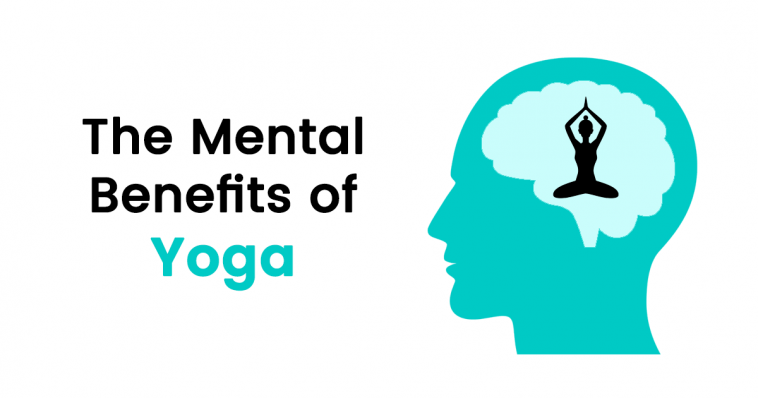The practice of yoga has been in existence for thousands of years, but in recent times scientific research has gradually begun to investigate the benefits of this practice. Extensive research has shown that yoga is particularly effective for improving symptoms of depression, anxiety, PTSD, and many other mental and physical health issues as well. Through these promising findings, the field of yoga therapy has begun to emerge as a reliable and successful discipline. But how exactly does yoga benefit your mental health? And how can you start using these practices in your own life? See below to find out!
The Mind-Body Connection
To understand how yoga benefits your mental health it is important to understand the link between the body and the mind. Previously, modern science viewed the mind and body as separate entities in which the mind controlled the body’s functioning, but the body did not affect the mind. But recent research has begun to uncover that the body and mind are actually intimately connected, which has led to the creation of a new branch of medicine called psychosomatic medicine. The clearest example of these connections is through the gut-brain axis. Research on the gut-brain axis has shown that the biology and microbiota found in your intestines and stomach has a direct impact on your mental health. So, what you eat truly does affect your mind! This research suggests that by improving your digestive health, you can also improve your mental health. So, since many yoga poses directly impact your digestive system, then it is clear to see how yoga poses that target the body can ultimately affect the mind as well.
How Yoga Impacts Your Brain
Besides the basic connection between the body and mind through the gut-brain axis, yoga practice also affects other aspects of cognitive and neural health as well. Extensive research has shown that yoga practice directly stimulates the vagus nerve, which is the largest cranial nerve in the body that extends from the brain and down through your abdomen. The vagus nerve has a direct effect on your nervous system, helping you to switch out of fight or flight mode and into rest or digest mode instead. By practicing various abdominal, spinal, and throat stimulating yoga poses, you can begin to improve the tone of your vagus nerve, causing a shift in your nervous system, and relaxation of your body and mind.
Yoga practice has also been linked with both improved cellular growth and reduced cellular aging in the brain. Neuroplasticity is the natural process that occurs in your brain to form new neural connections and even the growth of new neurons through neurogenesis. Research has shown that yoga and meditation practice has a direct effect on stimulating both neuroplasticity and neurogenesis. Through these processes, this suggests that yoga may improve your ability to learn, make new connections, focus, and improve your brain’s overall health. Additionally, yoga practice has been linked with the ability to reduce cellular aging by reducing the effects of oxidative stress and telomere length shortening in your DNA or genetic material. All of these scientific terms essentially mean that yoga practice can help your brain form new connections, grow new cells, and extend the lifespan of those cells as well. So, overall, yoga practice has a highly beneficial impact on your brain and neural health.
Related: 5 Ways to Tame Your Mind in Stressful Times
Yoga and Mental Health
Past the neural benefits of yoga practice, yoga has also been shown to have many positive effects on mental and cognitive health as well. In general, yoga practice makes you happier, decreases symptoms of depression, reduces anxiety, and can decrease the impact of trauma. Trauma-informed yoga is now an extremely popular field in yoga and is commonly used by many mental health therapists to deal with everything from mild trauma to more complex cases of PTSD. Yoga practice also improves focus, concentration, and learning ability, suggesting that yoga practice can be a highly effective form of treatment for attention disorders like ADD and ADHD. Yoga practice also improves self-esteem and confidence, helping you to accept your body as it is, and practice self-compassion. Through regular yoga practice, you can also build your inner strength, giving you the tools to overcome difficulties in your life, break out of harmful habits, and healthily regulate your emotions.
Yoga practice in general encourages people to live a healthier lifestyle, connect with others, and commit to a more conscious life. Traditional yoga practice also includes many spiritual dimensions that have numerous positive effects on mental health. The primary traditional goal of yoga practice is to pursue self-actualization and connect with a higher power. Through this process, you can add greater meaning, purpose, and depth to your life which can benefit nearly every aspect of both your mental and physical health.
Related: Tapping into the Mind-Body Connection: Exercise and Mental Health
The Best Yoga Styles for Improving Your Mental Health
To improve your mental health through yoga practice, nearly any class can assist you in that process. But the best styles of yoga for improving mental health are the more restorative or gentle styles of yoga such as Yin Yoga, Restorative Yoga, and Hatha Yoga. However, faster-paced Vinyasa Yoga classes can also be beneficial for your mental health as well. The primary benefits of yoga practice for mental health actually draw from the practices within yoga that focus on breathing exercises and meditation. By learning to control the breath and relax the mind through meditation during yoga practice, you can gain back control over your nervous system and stimulate your body’s natural relaxation response.
Summary
Although many people practice yoga to improve their flexibility, strength, and physical health, yoga also provides numerous benefits to the mind as well. The knowledge of monks and yogis in the Himalayas is now finally coming into the West and being confirmed by science. So, next time you are on your yoga mat, try to notice how you feel before and after a class.
Don’t forget to share this article with your friends and family to inspire them to join you in a yoga class as well, so you can enjoy the benefits of yoga for mental health together!




